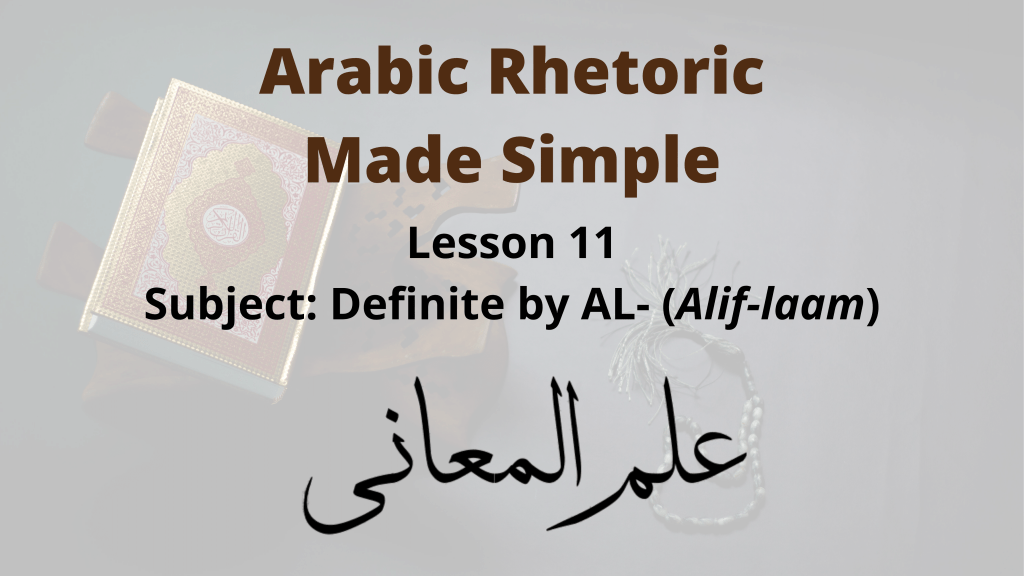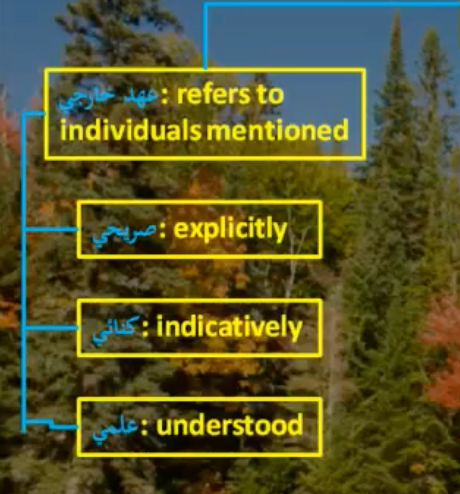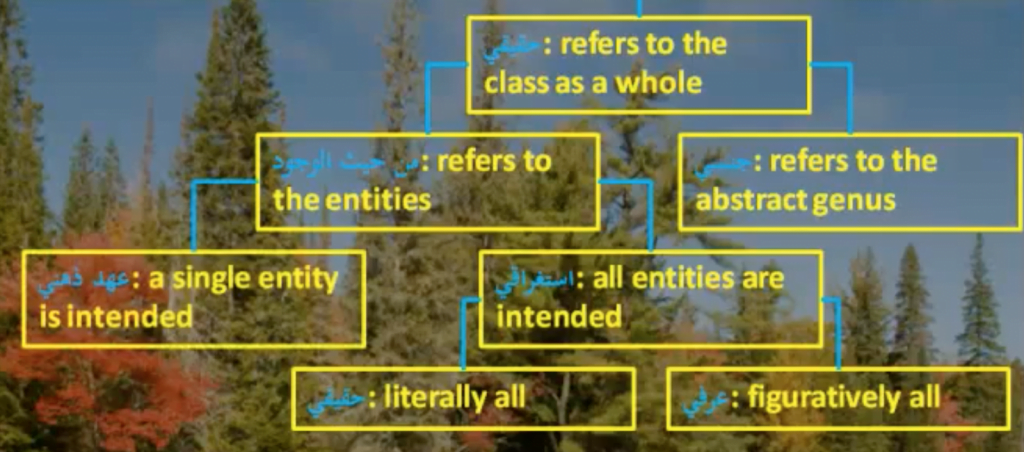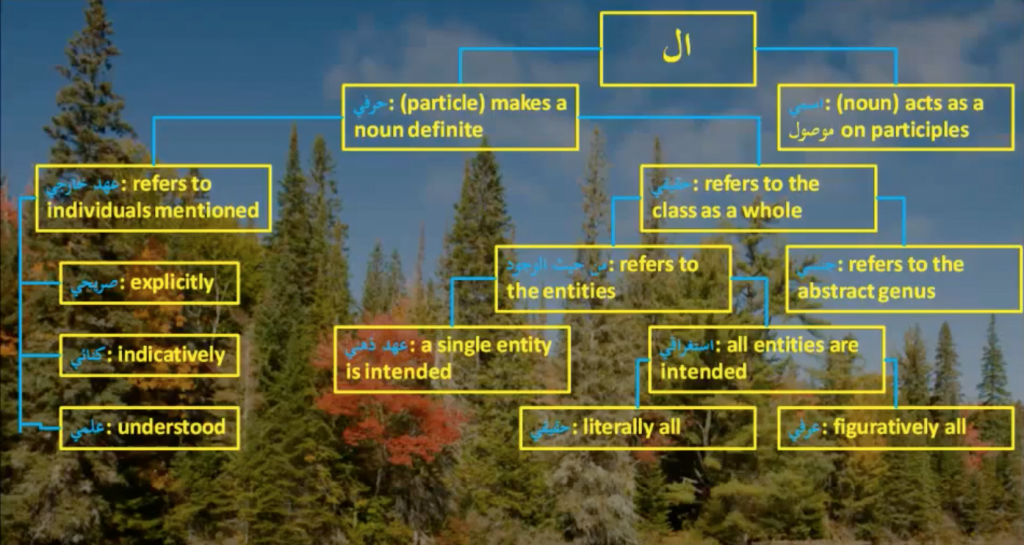
In today’s lesson on ilm ul-Balagha we are going to talk about why you would make the subject of your sentence definite by ال (alif-laam).
Background Information
You can learn pretty much all there is to know about ال (alif-laam) from this Wikipedia Article which I contributed to heavily sometime in 2010.
In today’s lesson, we are going to talk in detail about the meanings of ال (alif-laam), something which the Wikipedia article only skims over, and something of course that is very important to balagha.
Types of ال (Alif-Laam)

There are 2 ال (alif-laam) in the language.
1. The first is ال اسمى.

This is a noun that comes at the beginning of participles like the اسم الفاعل or the اسم المفعول, and acts like the word الَّذِي. So it is a موصول.
If you take an active participle like الفاعل, this is tantamount to saying الّذي يفعل.
2. The second is the ال حرفى.

This is the ال that we all know and love. It is a particle that comes at the beginning of a noun and renders the noun definite. It is the equivalent of the word “the” in English. It is a definite article.
For example, the word أسد means “lion”, or “a lion”. But the word الْأَسَد means “the lion”.
ال حرفى, always refers to something, just like a pronoun refers to something. We call this something the antecedent.
For example, if I say: “Look, that lion would make a perfect trophy”. Then I say, “The lion is getting away”.
When I say “The lion is getting away”, I am referring to the lion I just mentioned in the previous sentence when I said: “Look, that lion would make a perfect trophy”. That is the antecedent.
ال حرفى is divided into 2 types:
1. عهد خارجى– The antecedent is something real and tangible.

Like in the above example of the lion. The lion is actually something real that I can point to and look at.
Sometimes we like to divide the ال into categories based on the antecedent.

- صريحي – If the antecedent which is real and tangible was explicitly mentioned in some previous sentence.
For example, Allah says:

First Allah mentioned about “a messenger” and in the next sentence He said “the” messenger, obviously referring to the one He just explicitly mentioned.
- كنائي – When the antecedent wasn’t explicitly mentioned. But it was indicated towards.
For example, I say: “I can’t live in this piece of crap anymore”. Then you say: “Don’t sell the house just yet”.
When you say: “the house”, you are obviously referring to the house I indicated towards when I said: “I can’t live in this piece of crap”.
- علمي – The antecedent has neither been explicitly mentioned nor has it been indicated towards. But it is understood between the speaker and the listener.
For example, when we say: “the Prophet (peace be upon him)”, which prophet do we mean? Obviously, we mean Muhammad (peace be upon him), and this is something we automatically know without any prior mention or indication.
That was the ال حرفي that refers to something real and tangible.
The next type of ال حرفي is:
2. ال حقيقي – The one that refers to the whole category, not the actual things in that category.
For example: If I say: “The lion is a very ferocious animal”.
Which lion am I referring to when I say “the lion”? It is a whole category of lions that I am referring to. Not any specific lion.

When I refer to an entire category, I could be referring to it: abstractly or concretely.
- Abstractly.
For example, I could say: The market has always been an important part of civilisation.
This is called ال جنسي or the Laam of Jins.
Here I am not referring to a particular market. So, it is not عهد خارجي, instead I am referring to a category known as “market”. But even further than that I am referring to the market as an abstract idea.
- Concretely (not abstractly).
For example, I could say: The market should be separated from the mosque.
Here, again I am not referring to a particular market, so it is not عهد خارجي, instead I am referring to the category, known as “market”. But this time I am not talking about the markets as an abstract concept. I am referring to the category in relation to the real and tangible entities. I am keeping the actual markets in mind. It is not the abstract idea that I am talking about.
When I refer to a category concretely:
- My intention could be to encompass all the entities in that category. This is called ال إستغراقي or the Laam of Istighraaq.
For example, Allah says:

Notice the all in the translation.
Then when we say “all”, we could mean that literally or figuratively.

Like when I say: I collected all the evidence.
Obviously, I don’t mean absolutely all the evidence, but I mean all the evidence pertaining to this case. It is not literal “all” it is figurative “all”.
Finally, when I refer to a category concretely:
- my intention could be to encompass not all the entities, but only a single entity. A single random entity. This is called عهد ذهني.
For example, Allah says, quoting Yaqoob (peace be upon him):

Here, what does Yaqoob (peace be upon him) mean?
Is he afraid that a specific wolf will eat Yusuf (peace be upon him)? No, of course not. So, it cannot be عهد خارجي. It must be حقيقي.
Is Yaqoob (peace be upon him) afraid that the abstract concept of wolf will eat his son? No, of course not. Ideas don’t eat people. At least not literally. So, it cannot be جنسي.
Now is Yaqoob (peace be upon him), afraid that all wolves will come together and eat his son? All wolves in the world? Or all wolves in the city? No, of course not. So, it cannot be إستغراقي.
Is has to be عهد ذهني. In other words, Ya’qoob (peace be upon him) is afraid that some random wolf will eat his son. Notice that conceptually speaking, this ال doesn’t actually make a noun definite. In fact, it keeps it indefinite, because it refers to any member of the category.
So, these are the various meanings and connotations of ال, and this is something to consider when you make the subject of your sentence definite, using this method.
Here is an image that encompasses all the previously mentioned types of alif laam in Arabic:

- Proceed to next lesson: Subject as a possessive phrase in Arabic
- Return to index page: Intro to Ilm Ul-Ma’ani
- Start free lessons: Sign Up for Free Mini-class